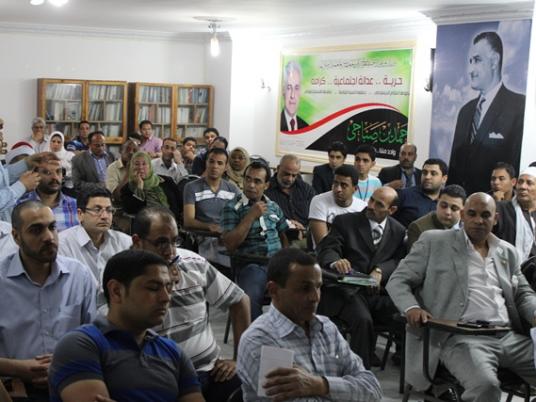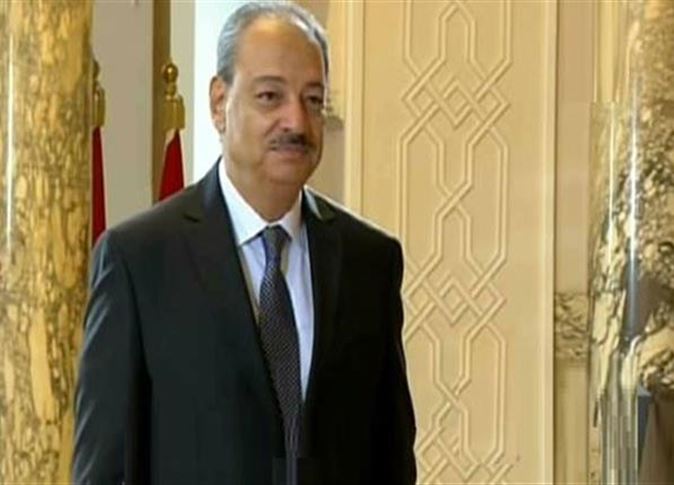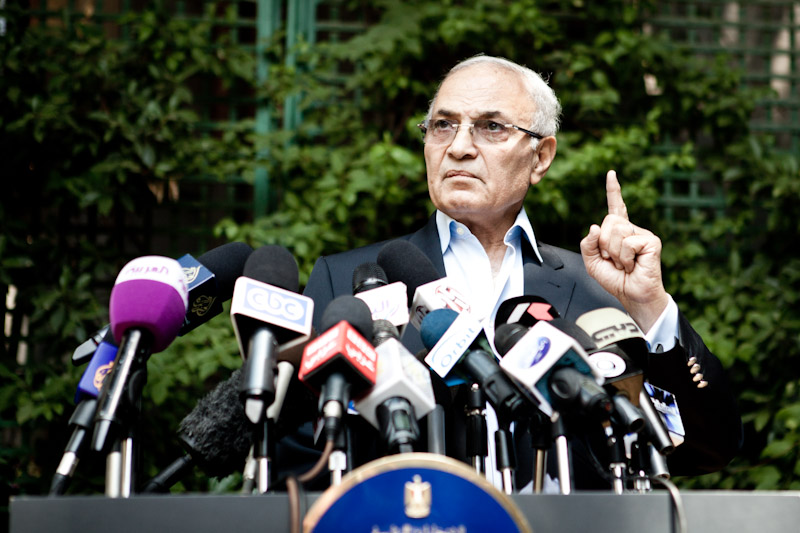
Under different circumstances, Nesreen Magdy would be finishing her third year at university studying hospitality. While the rest of her friends spend their days in classes and their nights studying or socializing, the 20-year-old has dedicated her year to Hamdeen Sabbahi’s presidential campaign.
Like many young pro-revolution Egyptians, Magdy got to know Sabbahi, a longtime Nasserist, through his activism.
“I first heard of Hamdeen during the 2009 protests against the Israeli bombing of Gaza,” she says. But it was his role in the 25 January revolution that made her decide to devote herself to his political agenda. “He always stood by what was right.”
Through his steadfast revolutionary stance, Sabbahi’s campaign has attracted dozens of die-hard supporters who consider him the answer to their search for a revolutionary president who could help create a more just Egypt. But even the most dedicated Sabbahi supporters realize he faces an uphill battle due to limited finances and lack of name recognition among the masses.
Mohamed Fouad, a 19-year-old university student, joined the campaign despite having heard of Sabbahi for the first time in January 2012.
“I saw him in a television interview. I was convinced by him because of his history and, when I met him, his modesty,” says Fouad. He was especially moved by seeing Sabbahi, on more than one occasion, take time out of a march or campaign rally to sit with a poor man he met on the street.
“He feels genuine,” Fouad said.
Magdy and Fouad spend most days and nights now marching in different parts of Egypt, carrying Sabbahi’s banners, accompanying the candidate himself, and conducting information sessions. As they found out on the campaign trail, they are not the normal demographic of Sabbahi supporters.
“Older people tend to know and support him more because he is a Nasserist,” Magdy said.
One of the main venues Sabbahi campaigners meet at is the headquarters of the Nasserist Karama Party, which Sabbahi founded, though he is running as an independent.
“His past speaks for him,” said Karama Party founding member Essam al-Gabakhangy.
In recent television interviews, Sabbahi has distanced himself from a blanket application of Nasser’s nationalist plan.
Nasser’s policies gave benefits to poor farmers by nationalizing farmland and introducing rent controls that kept landlords from forcing unfair rents on tenants. As a result, Sabbahi is sometimes seen favorably in rural areas.
“For farmers in my village, we know they like either the Muslim Brotherhood or Nasserists,” said Sameh Omran, a retiree from Nahya village in Giza Governorate. Omran and campaigners like him spend their days trying to spread news of the Sabbahi campaign by word of mouth.
At a meeting of Sabbahi supporters from Giza, many complained that with little more than a month before presidential elections are due to start, they still do not have comprehensive strategies to get the word out.
“I just need pamphlets or Hamdeen’s CV. If people know who he is, I’ll have an easier time convincing them to vote for him,” said Khaled Fawzy, a 33-year-old lawyer from the heavily populated area of Talbeya.
Urban campaigners find that Sabbahi is not well-known among those who do not read newspapers or follow talk shows.
“Our doorman did not know who he is, despite the fact that his campaign headquarters is right next door,” said Sara, a 17-year-old high school student from Cairo.
Campaigning for Sabbahi largely involves conversations about the candidate and his history. Since his days when he confronted former President Anwar Sadat as a student union leader at university, he has been one of Egypt’s most prominent opposition activists, especially for farmers’ and workers’ rights.
Many of those campaigning find it easy to speak about Sabbahi because they were wooed by him personally.
“When I met him, I felt like he was the only one who could restore the rights of the martyrs,” said 54-year-old baker Sayed Abdel Lateef. Abdel Lateef’s son Mohamed was killed during a protest on 28 January 2011. Sabbahi visited the family on Mother’s Day to pay his respects.
His personal appeal led many to his campaign.
“It’s enough for me that he not only fights for the poor, but he really respects them,” Abdel Lateef said.
Many who attended the Giza meeting and subsequent march said the campaign’s heavy online presence helped lead them there and to becoming a part of the campaign.
“I only got to know a lot about Hamdeen last week, but his campaign is by far the most organized online,” said physician Morqos Abdel Shaheed, who decided to join it after he heard that some of the main presidential candidates were disqualified.
“I felt that revolutionary candidates such as Hamdeen could now win. His name is being circulated a lot more among people in my area [Shubra] now,” he said.
Magdy and Fouad said they have no problems convincing individuals to vote for him.
“People on the street are very responsive and want to hear more about Sabbahi,” Magdy said.
But most campaigners seem conscious of the limitations of the campaign, despite the candidate’s good standing among those who know about him.
Up until early April, most campaign members were concerned with one thing: gathering 42,000 endorsements for the candidacy to be official.
“That was in and of itself a huge effort … Now we have to make more of an effort until the elections,” said a middle-aged woman who only identified herself as Hajja Fawzeya.
Campaigners are conscious of the financial constraints and are making personal efforts to push things forward. One man offered to stick 5,000 small stickers in his area, “just so people know what he looks like.” Another offered to help Sabbahi develop an agricultural platform that will help attract more farmers.
Others, despite their belief in him as a viable candidate with sound and consistent principles, take a more realistic view of things.
“Sabbahi’s is the poorest campaign [among serious contenders],” Gabakhangy said.
Many of the campaigners are aware that attempts to merge his campaign with that of former Brotherhood member Abdel Moneim Abouel Fotouh are underway, and few seem to mind.
“Once after finishing handing out posters for Hamdeen, I helped a young boy on the street near me pass out fliers for Abouel Fotouh,” said Magdy.
She doesn’t see a downside to the potential merger: “It will help Hamdeen, and help keep revolutionary votes together.”
The issue for some is that they would not like the man they believe in so much to run as a vice president.
“Hamdeen wouldn’t and shouldn’t be Abouel Fotouh’s deputy,” said Gabakhangy. He believes that Egyptians think of vice presidents as weaklings.
However, Gabakhangy was made to believe in the importance of a joint campaign while talking to a coffee shop owner about Sabbahi, and asking if he could paste his poster up in the shop.
“He was very welcoming,” Gabakhangy said, “but then he added, ‘Only if you bring me a poster of Abouel Fotouh that I can put beside it as well.’”



